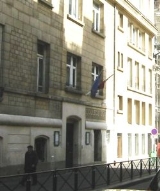
Collège Sévigné
Encyclopedia
The Collège Sévigné is a French
non-denominational private school
.
It is ranked 2nd in the city and 19th in the country by a french weekly magazine.
The school was founded in 1880 by Mathilde Salomon, becoming the first French non-denominational high school for young women, two months before the vote of the "Camille Sée" law establishing public secondary education for young women, and three years before the opening of the Lycée Fenelon. The founders, grouped in an association called "Société pour la propagation de l'instruction parmi les femmes", included Paul Bert
(1833–1886), former Minister for Education, and a militant for Public Education. The school became co-educational in 1969.
Collège Sévigné was also the first school in France
to open a kindergarten
, in 1909.
Famous contributors to the education program at the school have been Alain
, Gurevitch, Jankelevitch
, Dumezil
, Braudel, Mounier
, Carcopino, Merleau-Ponty, Jacqueline de Romilly
.
The 1935 Nobel Prize for Chemistry winner, Irène Joliot-Curie
, daughter of Marie Curie
, is one of the alumnae of the school, where she studied from 1912 to 1914 to obtain her Baccalaureat
.
The school is only one of three non-denominational private schools in Paris
.
The school is located on 28 Rue Pierre-Nicole in the 5th arrondissement.
Collège Sévigné offers classes from kindergarten to the Baccalaureat.
France
The French Republic , The French Republic , The French Republic , (commonly known as France , is a unitary semi-presidential republic in Western Europe with several overseas territories and islands located on other continents and in the Indian, Pacific, and Atlantic oceans. Metropolitan France...
non-denominational private school
Private school
Private schools, also known as independent schools or nonstate schools, are not administered by local, state or national governments; thus, they retain the right to select their students and are funded in whole or in part by charging their students' tuition, rather than relying on mandatory...
.
It is ranked 2nd in the city and 19th in the country by a french weekly magazine.
The school was founded in 1880 by Mathilde Salomon, becoming the first French non-denominational high school for young women, two months before the vote of the "Camille Sée" law establishing public secondary education for young women, and three years before the opening of the Lycée Fenelon. The founders, grouped in an association called "Société pour la propagation de l'instruction parmi les femmes", included Paul Bert
Paul Bert
Paul Bert was a French zoologist, physiologist and politician. He is sometimes given the sobriquet "Father of Aviation Medicine".-Life:Bert was born at Auxerre...
(1833–1886), former Minister for Education, and a militant for Public Education. The school became co-educational in 1969.
Collège Sévigné was also the first school in France
France
The French Republic , The French Republic , The French Republic , (commonly known as France , is a unitary semi-presidential republic in Western Europe with several overseas territories and islands located on other continents and in the Indian, Pacific, and Atlantic oceans. Metropolitan France...
to open a kindergarten
Kindergarten
A kindergarten is a preschool educational institution for children. The term was created by Friedrich Fröbel for the play and activity institute that he created in 1837 in Bad Blankenburg as a social experience for children for their transition from home to school...
, in 1909.
Famous contributors to the education program at the school have been Alain
Émile Chartier
Émile-Auguste Chartier, commonly known as Alain was a French philosopher, journalist, and pacifist.Alain entered lycée d'Alençon in 1881 and studied there for five years...
, Gurevitch, Jankelevitch
Vladimir Jankélévitch
Vladimir Jankélévitch was a French philosopher and musicologist.- Biography :Jankélévitch was the son of Russian Jewish parents, who had emigrated to France....
, Dumezil
Georges Dumézil
Georges Dumézil was a French comparative philologist best known for his analysis of sovereignty and power in Proto-Indo-European religion and society...
, Braudel, Mounier
Mounier
Mounier is the surname name of a prominent French-Egyptian family. The family house is located in the Alpes-Maritimes, France, a few miles away from Mont Mounier, near Nice. The family also owns Le Vigne du Mounier, or كرم منير, in Lake Mariout, Alexandria and Nile land in Egypt...
, Carcopino, Merleau-Ponty, Jacqueline de Romilly
Jacqueline de Romilly
Jacqueline Worms de Romilly, née David was a French philologist, classical scholar and fiction writer. Because she was of Jewish ancestry, the Vichy government suspended her from her teaching duties during the Occupation of France. she was the first woman nominated to the Collège de France, and in...
.
The 1935 Nobel Prize for Chemistry winner, Irène Joliot-Curie
Irène Joliot-Curie
Irène Joliot-Curie was a French scientist, the daughter of Marie Skłodowska-Curie and Pierre Curie and the wife of Frédéric Joliot-Curie. Jointly with her husband, Joliot-Curie was awarded the Nobel Prize for chemistry in 1935 for their discovery of artificial radioactivity. This made the Curies...
, daughter of Marie Curie
Marie Curie
Marie Skłodowska-Curie was a physicist and chemist famous for her pioneering research on radioactivity. She was the first person honored with two Nobel Prizes—in physics and chemistry...
, is one of the alumnae of the school, where she studied from 1912 to 1914 to obtain her Baccalaureat
Baccalauréat
The baccalauréat , often known in France colloquially as le bac, is an academic qualification which French and international students take at the end of the lycée . It was introduced by Napoleon I in 1808. It is the main diploma required to pursue university studies...
.
The school is only one of three non-denominational private schools in Paris
Paris
Paris is the capital and largest city in France, situated on the river Seine, in northern France, at the heart of the Île-de-France region...
.
The school is located on 28 Rue Pierre-Nicole in the 5th arrondissement.
Collège Sévigné offers classes from kindergarten to the Baccalaureat.

